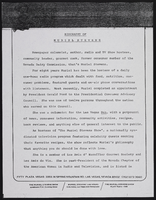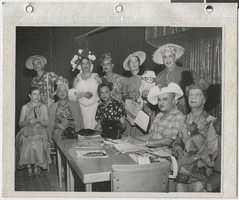Search the Special Collections and Archives Portal
Search Results

Transcript of interview with Bob Arum by Barbara Tabach, October 20, 2016
Date
Archival Collection
Description
Bob Arum is the founder and CEO of Top Rank boxing promotions company in Las Vegas, Nevada. Born in New York, Arum is a former attorney and a member of the International Boxing Hall of Fame. He promoted his first fight for Muhammad Ali in 1966 and moved Top Rank’s headquarters to Las Vegas in 1986. He has produced countless fights in the city and helped to make it “The Fight Capital of the World.” In this interview, Arum talks about the path that led him to a career in boxing promotion, from childhood in Brooklyn, New York, to education at New York University and Harvard Law School, and finally meeting Muhammad Ali while working at New York law firm. He discusses his work with Ali, as well as other boxers, including Marvin Hagler, Sugar Ray Leonard, Tommy Hearns, Roberto Durán, George Foreman, and Oscar De La Hoya, and the growth and evolution of the sport over the past forty years. In addition, Arum talks about the role of Judaism in his life, his involvement with the local Jewish community, and the importance of the Chabad movement.
Text

Biography of Muriel Stevens, circa 1975
Date
Archival Collection
Description
Typed description of Muriel Stevens' career.
Text
Marta Sorkin oral history interview
Identifier
Abstract
Oral history interview with Marta Sorkin conducted by Claytee D. White on March 02, 2009 for the UNLV @ 50 Oral History Project. In this interview Marta Sorkin discusses her family and her experience moving to California, and then to Las Vegas, Nevada. Sorkin talks about working at the James R. Dickinson Library at University of Nevada, Las Vegas and later in Lied Library, and helping to implement and update various databases. She briefly discusses her involvement with Hillel and the Jewish Federation of Las Vegas.
Archival Collection

Transcript of interview with Florence McClure by Joanne Goodwin, January 24, 1996 & February 6, 1996
Date
Archival Collection
Description
Florence McClure came to Las Vegas later in her life, but the state felt her presence and the community her contributions as if she were a native daughter. Introduced to the League of Women Voters in 1967, McClure met her political mentor Jean Ford and learned how to practice the core elements of democracy. She put those tools to work in a number of ways, however her participation in the creation of the Rape Crises Center and her advocacy for locating the women’s prison near Las Vegas are two of her long-lasting efforts. Florence Alberta Schilling was born in southern Illinois where she enjoyed the security of a tight-knit family and the independence to test her abilities growing up. She graduated from high school and attended the MacMurray College for Women at Jacksonville. With the attack on Pearl Harbor in 1941, she began a series of jobs working for the war effort. She moved to Ypsilanti, Michigan with a girlfriend to work at the Willow Run Army Airbase and then moved to Miami, Florida where she worked for the Provost Marshall in the Security and Intelligence Division. She met her husband, James McClure, at the time and they married in 1945. During the next several years, they raised a family and moved around the country and to Japan with the military. McClure came to Las Vegas in 1966 as part of her work in the hotel industry which she engaged in after her husband’s retirement from the military. She had worked in California and Miami Beach, but it was Burton Cohen in Los Angeles who invited her to join him in a move to Las Vegas to build the new Frontier Hotel and Casino. Following the completion of the Frontier, she moved to the Desert Inn with Cohen in 1967 and worked as the executive office manager. After a few years, she decided to leave the industry and complete her college education. She graduated from UNLV in 1971with a BA in Sociology with an emphasis on criminology. She was 50 years old. McClure had been a member of the League of Women Voters for a few years at that point and had learned the political process from Jean Ford and workshops on lobbying. She had numerous skills that were waiting to be tapped when she attended an informational meeting on the incidence of rape in the Las Vegas valley. From that meeting, a small group of individuals, including McClure, began the organization Community Action Against Rape (later renamed the Rape Crisis Center) in 1973. It was the first agency in the area devoted to serving individuals who had been assaulted and changing the laws on rape. The organization’s first office was set up in McClure’s home. Over the next decade, she worked to change attitudes and reshape policy by constantly raising the issues of sexual assault with police officers, emergency room doctors, judges, and legislators. Her role as an advocate took her into hospital emergency rooms and courtrooms to assist victims. It also took her to the state legislator to lobby repeatedly for a change in laws. During this period, journalist Jan Seagrave gave McClure the nickname “Hurricane Florence” - a fitting moniker that captured the force with which McClure attacked the issue. As a result of her efforts and those of the people with whom she worked, we now 1) recognize rape as a crime of assault; 2) forbid the sexual history of a rape victim from being used against her in court; and 3) recognize marital rape. In addition to learning about Florence McClure’s activities, the reader of this interview will gain information on the role of civic organizations like the League of Women Voters in engaging the voluntary efforts of women in the post-war years.
Text

Transcript of interview with Helen Naugle by Irene Rostine, October 31, 1996
Date
Archival Collection
Description
Prior to 1962, Helen Naugle had only visited Las Vegas once in her life while traveling from Idaho to California for a vacation with her husband and her boss. The group made a quick stop so her boss could interview for a position with EG&G and, as fate would have it, EG&G did not hire Helen’s boss. However, they did extend a job offer to Helen’s husband. A month later, Helen, her two daughters, and her husband became residents of Las Vegas, Nevada. Before moving to Nevada, Helen enjoyed singing in super clubs and performing on her radio show, “Melodies from Meadowland” and working for American Machine and Foundry. Upon her arrival in Las Vegas, Helen went to work for Bonanza Airlines before attending real estate school. In 1963, Helen opened her first office, Bruce Realty, and in 1965, she obtained her Broker’s license. She spent the next ten years selling general real estate. During this period, Helen was an active member of the Board of Realtors, as well as an early participant in the Board’s newly formed Women’s Council. Fate would strike again in Helen’s life while she was visiting her daughter at college in Arizona where she read an article in the Phoenix newspaper about a group of brokers who had formed a networking association to sell hotels and motels across the country. As a result of her initial contact with this association, Helen spent the next four decades selling hotels and motels throughout the State of Nevada, including Las Vegas, Elko, Tonopah, and Wells. She eventually became the first woman President of the American National Hotel-Motel Association. The cultural diversity of hotel and motel buyers would provide Helen with opportunities to travel the world and work with buyers from many different countries and cultural backgrounds. It also led to Helen’s membership in the FIABCI (International Real Estate Federation) and her Certified International Property Specialist and Federation of International Property Consultants certifications. Helen was also selected by the Association to represent the Air Force as “Innkeeper Evaluator” for one year. This honor took her to five Air Force bases in the United States and to Clark Air Force Base in the Philippines. During Helen’s career in hotel and motel real estate sales, she witnessed the transition from “mom-and-pop” American buyers to the influx of international buyers predominately from East India and Asia. The opportunities for helping repeat buyers and sellers gradually went away, as foreign buyers entered the market and tended to resell their properties to friends and family members from their own countries. During the latter part of her career, Helen found time to give back to the Las Vegas community through her volunteer work helping to establish the Scleroderma Foundation of Nevada. She also served on the Board of Directors of the Downtown Las Vegas Partnership where she focused on public safety in the area encompassing the Fremont Street Experience. Her work with both of these organizations allowed her to draw on her career experience for the benefit of others. Whether it was fate, or as Helen put it, she “just lucked into a lot of things,” one thing is certain - Helen Naugle was certainly a trail blazer for women in the hotel-motel niche of the real estate business, not only in Nevada, but across the nation.
Text

Photograph of a group of men dressed in costumes, 1950s
Date
Archival Collection
Description
A group of men from the Las Vegas Jewish Community Center are dressed in women's dresses and hats, possibly for a fundraising event. Seated L-R: Kay Wallerstein, Louis Mack, Dave Zenoff, Al Goot, and Adam Gobel. Standing L-R: "Doc" Knoller, Dave Messing, Ben Rosenfeld, unidentified, and Jerry Mack.
Image
Esther Toporek Finder oral history interview
Identifier
Abstract
Oral history interview with Esther Toporek Finder conducted by Barbara Tabach on June 08, 2016 and June 28, 2016 for the Southern Nevada Jewish Heritage Project. In this interview, Finder discusses her childhood and her passion for the Holocaust survivor community. She shares her experiences interviewing survivors and their descendants over the years. In addition, she reflects on her long reach within the survivor community and highlights the traveling, teaching, and community service opportunities she has had.
Archival Collection

Transcript of interview with Henry Kronberg by Barbara Tabach, February 26, 2015 and April 13, 2015
Date
Archival Collection
Description
Interview with Henry Kronberg by Barbara Tabach in two sessions, February 26 and April 13, 2015. In the first session Kronberg talks about his childhood in Germany and Poland and his experience being imprisoned by the Gestapo, and transported to a concentration camp. He survived the Holocaust and met his wife, and they moved to the United States in 1946. He discusses being reunited with his sister in Las Vegas after decades of searching, and moved his family to Las Vegas in 1962. Kronberg talks about becoming involved with Jewish life here, and his wife, Lillian's involvement at Temple Beth Sholom. In the second session, Kronberg discusses purchasing Stoney's, a loan and pawn shop, including some of the clientele and merchandise. He also discusses other social and environmental concerns like anti-Semitism and water resources in Southern Nevada.
Henry Kronberg was born in 1920 and spent his early childhood in a town on the border of Poland and Germany, about 40 miles from Krakow. For years he felt uncomfortable telling his story of surviving the Nazi concentration camps of World War II. Today his name is linked to the Sperling Kronberg Mack Holocaust Resource Center in Las Vegas. And in his soft-spoken manner, Henry recalls his ordeal of loss of family and survival during this most heinous of situations through backbreaking labor and ingenuity. At the end of the war, Henry met the love of his life, Lillian, also a survivor. The two married in 1946 in Frankfurt and immigrated to New Jersey where she had relatives. He describes their difficulties and the various jobs he held until becoming an excellent baker. Then in 1962 an interesting choice took him to a bar mitzvah in Canada. While there the dinner conversation lead him to a great discovery?his sister Lala had survived and was living in Las Vegas. Soon he moved his wife and daughter to Las Vegas. His first foray into business was with his brother-in-law. However, soon it was important to be independent and to control his own destiny. He purchased a going concern, Stoney's Pawn Shop, from Dr. Alexander Coblentz, one of the city's first doctors. He became the fourth owner of Stoney's and operated it until selling it to Steven Mack in 1998. Henry and his wife were active in the Jewish community. They joined Temple Beth Sholom and became fast friends with many of the early leaders of Las Vegas and became a respected member of the secular and Jewish communities.
Text

Transcript of roundtable interview about Kristallnacht with Esther Finder, Raymonde Fiol, Alexander Kuechel, Philipp Meinecke and Rabbi Felipe Goodman, by Barbara Tabach, March 17, 2015
Date
Archival Collection
Description
In this interview, the participants discuss their experiences during Kristallnacht, and the commemoration events in southern Nevada with Holocaust survivors and their families. Mr. Kuechel recounts his journey through concentration camps and being liberated by the Russians. Rabbi Goodman talks about meeting Mr. Meinecke, whose grandfather was a high-ranking SS officer. Meinecke discusses his upbringing in Germany and trying to learn about his family's involvement in the Holocaust, and the hope he felt after the fall of the Berlin Wall as Jews returned to Germany. The group discusses the importance of Holocaust education because there are still so many untold stories.
On November 9th to November 10th, 1938, in an incident known as Kristallnacht, Nazis in Germany torched synagogues, vandalized Jewish homes, schools and businesses, and killed close to one hundred Jews. In the aftermath of Kristallnacht, also called the Night of Broken Glass, some thirty thousand Jewish men were arrested and sent to Nazi concentration camps. German Jews had been subjected to repressive policies since 1933 when Nazi Party leader Adolph Hitler became chancellor of Germany. However, prior to Kristallnacht these Nazi policies had been primarily nonviolent. However, after Kristallnacht conditions for German Jews grew increasingly worse. During World War II, Hitler and the Nazis implemented their so-called final solution to what they referred to as "the Jewish problem" and carried out the systematic murder of some six million European Jews in what is now commonly known as the Holocaust.
Text
Deanne Alterwitz-Strasler oral history interview
Identifier
Abstract
Oral history interview with Deanne Alterwitz-Stralser conducted by Barbara Tabach on November 01, 2014 for the Southern Nevada Jewish Heritage Project. Alterwitz-Stralser discusses moving to Las Vegas, Nevada with her husband and their four children to assume ownership of Walker Furniture, leading the design and merchandising elements of the business, and integrating into the local Jewish community.
Archival Collection
